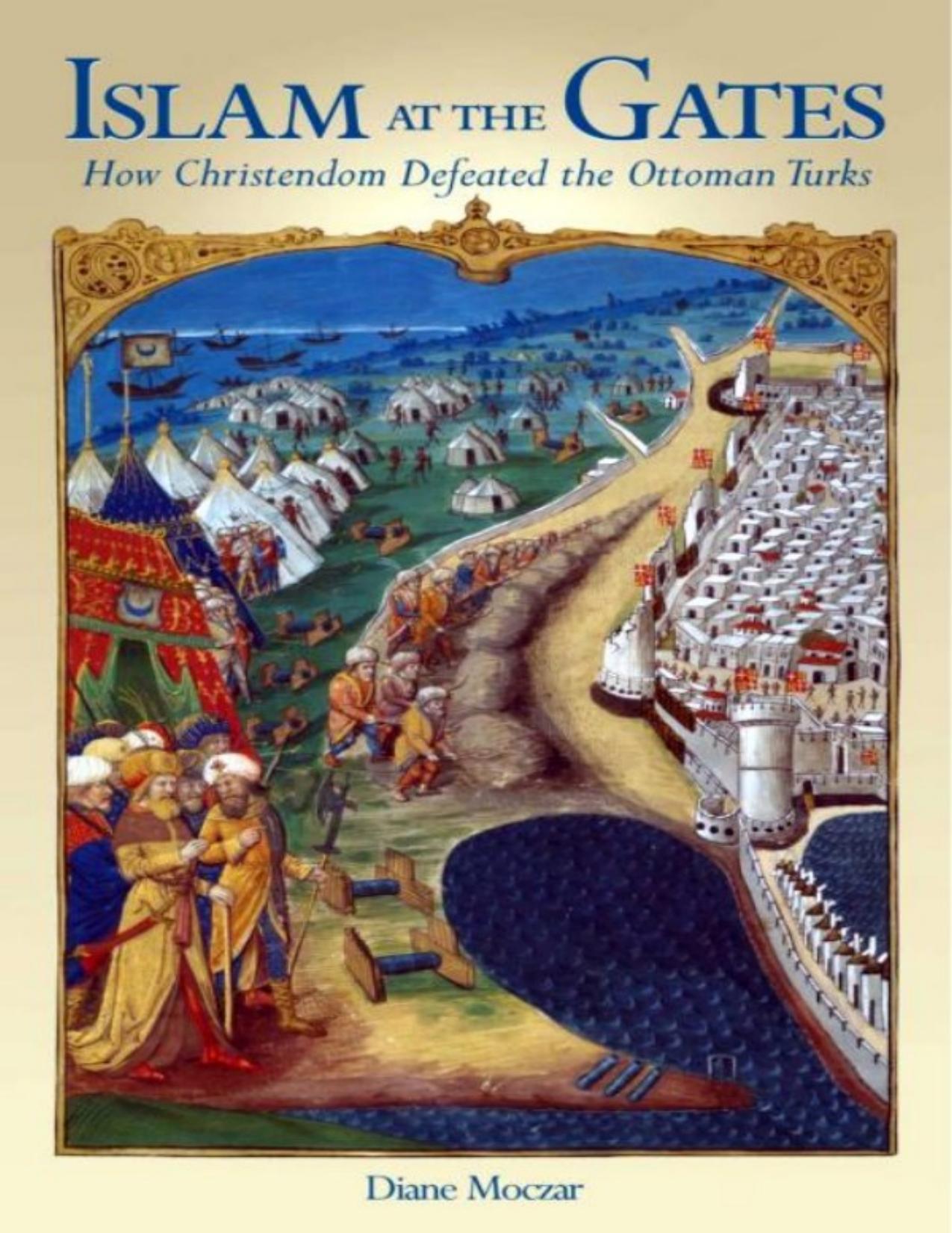Islam At The Gates: How Christendom Defeated the Ottoman Turks by Diane Moczar

Author:Diane Moczar [Moczar, Diane]
Language: eng
Format: epub, pdf
Published: 2011-01-12T06:41:00+00:00
Martyrdom in Otranto
The news from Rhodes having again unleashed his terrific temper, Mehemmed now sent an army to southern Italy in August 148o. He could do this with impunity, because the VenetianTurkish treaty had neutralized the most powerful Italian fleet, that of Venice. (In any case, Venice was the rival of Naples, the chief power in the south and might not have been unhappy to see Neapolitan territory attacked.) Brindisi had been the original target, but Otranto was substituted because it seemed to the Turks an easier strategic target. The town was quickly taken in a surprise attack by cavalry, with much loss of life and many of the buildings burned. Of the some zz,ooo inhabitants, z z,ooo died, often hideously tortured in the Ottoman way, and most of the rest enslaved. Eight hundred who refused to convert to Islam were gruesomely put to death, their bodies thrown to dogs. They have since been beatified by the Catholic Church. The archbishop, taking his stand in front of the altar in his cathedral, remained praying with his priests around him and the Blessed Sacrament in his hands until the Turks took him and sawed him in two. The same hideous death - "the favorite Ottoman mode of intimidation," a historian has remarked - was meted out to the commandant.
The Turks ravaged the countryside, but their savagery proved counter-productive: they needed supplies for their move north to Rome, but curiously enough the surviving inhabitants could not be coaxed back to serve their enemy's needs. The Turks, in the course of their forays, began to face armed resistance from King Ferdinand of Naples. Ferdinand and Isabella of Spain sent troops and ships too, and soon the Turks were bottled up in Otranto. The sultan, however, was widely expected to arrive in person at any time.
In Rome, the panic was as keen as if Mehemmed were already at the gates. Pope Sixtus IV considered fleeing, but in the end decided to remain and send envoys throughout Italy and Europe to mobilize forces for the defense of the peninsula. He also sent Blessed Angelo Carletti de Chivasso, a Franciscan theologian, to preach a crusade against the Turks. Sixtus, like several other popes of his day, was embroiled in Italian affairs. As ruler of a central Italian state, he had intrigued and quarreled with the others, but now he urged a common front against the Turks and himself gave the example of making peace with his enemies. Meanwhile the siege dragged on, while defense funds were collected and more ships built. The king of England regretted that he couldn't possibly do anything to help; the German states could not agree on what, if anything, to do; France would help on condition that everybody else did too. The Italian states were more forthcoming, except for Venice, which was now allied with the Turks.
May brought surprising news of Mehemmed's death. The sultan had been in Asia in the spring; as usual, he had kept his plans secret, so it is not known whether he intended to besiege Rhodes again, invade Egypt, or do something else.
Download
Islam At The Gates: How Christendom Defeated the Ottoman Turks by Diane Moczar.pdf
This site does not store any files on its server. We only index and link to content provided by other sites. Please contact the content providers to delete copyright contents if any and email us, we'll remove relevant links or contents immediately.
| Africa | Americas |
| Arctic & Antarctica | Asia |
| Australia & Oceania | Europe |
| Middle East | Russia |
| United States | World |
| Ancient Civilizations | Military |
| Historical Study & Educational Resources |
The Battle of Mogadishu by Matt Eversmann & Dan Schilling(612)
The Confidence Men by Margalit Fox(536)
The Spymaster of Baghdad by Margaret Coker(533)
A History of the Muslim World since 1260: The Making of a Global Community by Vernon O. Egger(516)
Jack the Ripper and the East End by Peter Ackroyd(473)
Empire of Fear: Inside the Islamic State by Andrew Hosken(465)
The Crimean War by Winfried Baumgart(461)
Islam At The Gates: How Christendom Defeated the Ottoman Turks by Diane Moczar(460)
The Afghanistan File by Prince Turki AlFaisal Al Saud(456)
The Jerusalem Diamond by Noah Gordon(454)
Akhenaten by Dominic Montserrat(443)
A Concise History of Greece (Cambridge Concise Histories) by Richard Clogg(441)
Israel: Ancient Kingdom or Late Invention? by Daniel I. Block(439)
The History of Jihad by Robert Spencer(430)
Enemy in the East by Rolf-Dieter Müller(429)
The Privatization of Israeli Security by Shir Hever(427)
Destroying a Nation: The Civil War in Syria by Nikolaos van Dam(425)
The Nine Lives of Pakistan by Declan WALSH(416)
The Dirty War in Kashmir by Shujaat Bukhari(405)
